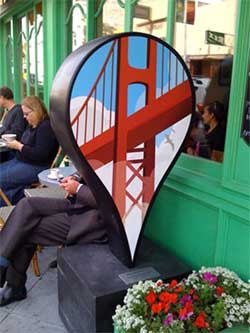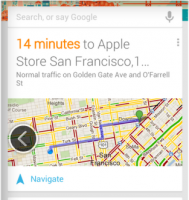Understanding Google My Business & Local Search
Is Google Debranding Local?
 Local, like many developments at Google, has always been many things; a brand (G+Local, Places), a product (Places Search, the +Local App) and an internal & external API service (local data in Now, Earth or 3rd party products).
Local, like many developments at Google, has always been many things; a brand (G+Local, Places), a product (Places Search, the +Local App) and an internal & external API service (local data in Now, Earth or 3rd party products).
And as David Mihm has pointed out, Google’s branding of local has always been muddled and caused confusion in the market place. But now it would appear that the confusion will someday end and that both the local brand and the forward facing search product (Places Search) are falling by the wayside.
Local will persist as a service feeding critical contextually relevant data to the many current Google products that use local data and the many that are likely to be coming rapidly down the pipeline.
Local as brand & product – a History
 Google Local was first rolled out in 2004 and was called just that. Within a year the Local Business Center (aka LBC) was created to gather business data directly from business owners. In 2006 the forward facing Google Local became (and was integrated into) Google Maps.
Google Local was first rolled out in 2004 and was called just that. Within a year the Local Business Center (aka LBC) was created to gather business data directly from business owners. In 2006 the forward facing Google Local became (and was integrated into) Google Maps.
At the time, local data was displayed as universal results on the main search results page and had a prominent display within Maps as both a list and a page.
In July 2009, under Carter Maslan, Google started promoting their local business listing data with Google’s first locally oriented, forward facing Favorite Places consumer campaign. In April, 2010, the dashboard was renamed from the LBC to Google Places. In October 2010 simultaneously with Marissa Mayer’s move to the local side of Google search, Places Search was introduced along with Place pages to replace the Maps only interface as a destination for searchers wanting additional local business information. Throughout 2010 it appeared that Google Places was taking on a life of its own.
 In May 2012, Places was rebranded once again by Mayer as Google+ Local. There was widespread media coverage as Marissa Mayer appeared on TV and was quoted in the major media outlets announcing G+ Local. This change along with Zagat style reviews seemed to be the future. Places search retained its standalone status as a search page and remained one click away from the main results. Now though local results clicked through to a business landing page that had been moved under the Plus environment and were called Google+ Local pages.
In May 2012, Places was rebranded once again by Mayer as Google+ Local. There was widespread media coverage as Marissa Mayer appeared on TV and was quoted in the major media outlets announcing G+ Local. This change along with Zagat style reviews seemed to be the future. Places search retained its standalone status as a search page and remained one click away from the main results. Now though local results clicked through to a business landing page that had been moved under the Plus environment and were called Google+ Local pages.
With the departure of Meyer in July 2012, the G+ Local branding seemed to wane. Local appeared to take on a second class relationship to Plus. The Places Dashboard seemed to be in danger of being replaced by the G+ Page management system.
Google+ Pages –
When Google finally rolled out the new business management interface for non social listings earlier this year, they did retain the business brand – Google Places for Business Dashboard, but the interface sensibility and role seems to be one of G+ Page lite rather than anything approaching fully independent status. While business facing only, the new dashboard is however the one area where a distinct local brand has been retained.
 More importantly the business listing page for each business seems to have lost the Google+ Local moniker. Going forward, each business’s will be referred to as a Google+ Page.
More importantly the business listing page for each business seems to have lost the Google+ Local moniker. Going forward, each business’s will be referred to as a Google+ Page.
These local landing pages are just one type of page amongst the many G+ Page types (events, products, brands, institutions, arts and others). In local the G+ Page will be either social (4-tab) or not (2-tab) but will no longer have a distinct presence or brand like Places search to highlight the results. For the most part, the page will be managed from the new Google Places for Business interface although there is a confusing parallel management interface in G+.
Over the last months we have seen what appears to be the final nails in the branding of Google Local as the links to Places search were removed and Places search results became personalized results for searchers in the new Google Maps. As if to remove the specter of Meyers influence and put an exclamation point on the end of local branding, it has been announced that her once cherished Zagat rating system was also to be mothballed in favor of a 5 star system.

The Role of Local at Google –
This doesn’t mean that local business data is decreasing in importance to Google, in fact just the opposite. Most of Google’s new products (think Now and Glass) rely on local data as an integral part of their appeal but it would appear that the Google+ Local brand and the Places Search product have gone the way of Buzz. And these brands seem unlikely to be replaced.
Most local searches are conducted and fulfilled on the home page of Google and that will continue to be. So while Local as a brand and product seems to be no more, the local data that Google displays across so many of their products will continue to be important and in all likelihood will become more important.
Your thoughts?
Thanks to David Mihm for his great reference: A Brief History of Google Places.
© Copyright 2026 - MIKE BLUMENTHAL, ALL RIGHT RESERVED.



Comments
14 Comments
Clear as mud Google. Those of us in Portland can add another moniker to the mess above: Hotpot (remember that?).
Although it *finally* feels like Google is getting its act together in this local management mess. I hope.
Nice work continuously and clearly overing a messy situation Mike.
@Josh
I think the Google getting its act together on local management includes clearer end user and smb messaging as well. We shall see
@Scott
I think to some extent what you described has been and continues to be the approach and that the various and sundry branding tactics are a result of changing local management and the fact that Google seems to operate on a 3 month marketing horizon (if that). And the recent elevation of the business owner call to action on the front page is part of that process.
Very thought-provoking post, Mike!
Most articles track various aspects of Google history (such as Local) as if it was an idea Google put out there, and was later modified to address perceived improvements, personal alteration by the person-in-charge, etc.
Not meaning at all to sound like a conspiracy theorist, but what if the actual Google approach was different?
What if, back around 2004 Google said to its corporate self, “You know, we’ve got an awesome search engine, but we don’t have enough detail on local businesses. Not only location, but hours of operation, exact locations, details… If we could get the local businesses to give us that information, our SERPs would be amazing!”
What if they conceived Local as a way to get businesses – nay, to compel them to give them – that information, and the changes are just ways to alter the presentation of that information, and to continue to keep the pressure on the businesses to provide the info – that is, “if you don’t provide the info we want, it will cost you, in the form of placement.”
With that perspective, then all the changes are just window dressing – the purpose of Local (in whatever form) is to gather information. Just as the purpose of G+ is not to create a social platform, but to require searchers to log in – thus allowing Google to gather better stats on usage, search, etc. and tie it all to a person.
It’s all about the data.
I’m watching from the sidelines of the UK with my nose placed against the sweetshop window unable to get at any of the goodies.
I’m still trying to work out which dashboard will allow me to control the info on the G+ Pages that have been generated for my clients by Google. My existing clients don’t have access to the new Google Places for Business dashboard and are stuck in some inbetween world. Even my friends in the US have never seen some of the things that I present as screenshots.
I just want a proper set of instructions that will remain constant for more than 10 minutes.
Hell, I’d even settle for a name that remained constant for more than 10 minutes.
Google conspire to make me look incompetent at every turn. My clients want their big listings back even when they have achieved a front page in the current version of Places.
They’re not interested in the twists and turns of Google’s thinking, they don’t understand about making search personal, they just want their business to be ranked as prominently as possible and for the phone to ring.
And they want me to know how to do it… like I did in the past.
Rant over…
Mike:
For business purposes I was trying various searches, first on a pc and later with a mobile.
The new maps visual is WOEFULLY lacking as a thorough source of information for certain search types; ie restaurants for particular towns in suburban areas.
In certain communities with 15-45 restaurants I would see a couple then references to far away communities. I then used the traditional maps version and it now is also woefully weak.
It seems that certain business signals trump location. Very weak relative to lists provided by Yelp, tripadvisor and some other apps and lists.
I know google keeps switching presentations, algos, importance of signals, etc.
I recently polled customers as to their uses of local apps and signals.
I see a lot of usage besides google.
I’d say with all these different switches and varieties and algo’s and filters, and presentations….there is a basic interest in finding local information. In the context of putting all this together…it seems to me google is outsmarting itself.
Google seems to be outsmarting itself…and some of the evidence is in our large number of customer responses. They are using other means besides google to look up local smbs.
there is a lot of competition out there. Tell people what is available locally. Don’t get too smart for yourselves.
Just my $0.02 😀 (plus the commentary from a random group of customers from the above smb and some others)
@Josh
“*finally* feels like Google is getting its act together”. Unfortunately, I don’t see anything “together”. I see more broken pieces on the floor being swept up and headed to the trash can.
@Scott
Interesting theory. And data is a big deal. But, as Google has pounded us for years on, so is RELEVANCE! When I cannot get a simple phone number for a local service provider when using my historically favorite (and relevant) search engine, it becomes irrelevant.
@Jo
We feel your pain! Good rant though. Are you getting this, Google?
@Dave
Google has not “outsmarted itself”. There is nothing smart about this. This path since the introduction of Google+ has been FUBAR. And that is just plain stupid.
@Dave
Were you searching on the main Google search or within the new Maps?
Yeah, Mike:
Local Google is confusing, changing, not branded, mixed with other applications. Its messy, with a long history, and confusing.
One thing that users want is local info. They really want it for quick purchase decisions. There are a wealth of applications being built and delivered.
They also want info on longer term larger purchases. But again they want local information with depth of info.
Google’s many changes have somewhat diluted this info IMHO. Businesses struggle with getting the info on google.
And then google’s monopolistic control of search doesn’t always get it right.
Meanwhile one only needs to occasionally review Greg Sterling’s blog on developments in the local arena: http://screenwerk.com to see the plethora of entities chasing local information, and chasing advertising dollars. One can find these developments in a wealth of other publications. Its enormous.
Meanwhile our non scientific review of apps used by our customers found an endless array of effective apps for finding local smbs.
Some are DAMN GREAT!!!!! and more of them are more focused, more nimble, more responsive than google’s package of all things local.
I’m not sure “LOCAL” is a hard category for google. Its now meshed with google+. Its endlessly changed over the years. It still has problematic methods for getting info correct.
You have it as a specific category…but does Google look at it that way.
One thing I know is that google seriously wants all that local advertising $$$$ as do all these competing apps and presentations. Google may not Loudly broadcast its desire and need for these $$$$ but make no mistake google wants the bucks as much as everyone else.
But its delivery is now muddled and in some way deficient to other sources of local info.
As both seo and local smb operator I wear a couple of hats. If I put on the SMB operator hat…I’m looking at how I spend our advertising $$$ that all these operators want.
If there are more clear, better sources of info than google we’ll move our $$$ as the customers move.
And the customers will find them.
In a different context we interviewed a number of restaurant operators in the DC region. Here is the interesting thing we picked up.
Reviews are now spread pretty dramatically among various sites (3 major sources in the DC region–google, yelp, and opentable). All 3 have apps. Then there are other sources to pick up this kind of information.
One thing from the operator side that resonated: Sources of leads and accessing the info on the restaurants is now viewed as diverse and fractionalized with many sources driving customers.
There is no ONE Single dominant source for the leads or where to put advertising $$$ if at all.
When other sources get good…and if google delivers muddled crummy info…the users and the advertising $$$$ will go elsewhere.
To repeat: I know you view LOCAL as a category. So do I and many folks doing local SEO. SMB’s view their businesses as local.
Does Google think this way???? not always sure.
Mike:
to answer the question:
I searched on the desk top on google.com.
I used the new google maps info. It was M.I.S.E.R.A.B.L.E from an info perspective. Pretty…but informationally…not useful at all.
I went to classic maps. Better info than new maps…but surprisingly limited.
I glanced through mobile. I have to look harder and better at that. I keep seeing for our different smb’s increases in mobile traffic against pc’s. And frankly none of these smb’s are instant gratification or immediate purchase choices. Some are focused on higher end older customers…but even there we see greater volumes of mobile and tablet traffic. Its not over 50% in either case but the percentages of mobile and tablet have soared.
I’ll search again strictly off of mobile….I think that is where the competition is moving.
Hi Mike,
This really makes some sense when you look at the clear picture of Google and where Google appears to be headed – a purely user-centric, personalized search environment with less segmentation of products, and a complete merge of the entire platform to center around the user.
I would think that many of Google’s pipeline products will also merge into this concept in the same fashion – first adopting popularity as stand-alone products, then tested, then merged as further data sources / services within the environment.
Very thought-provoking stuff, Mike.
I’m not sure I see how Google is “debranding” local. Rather, it seems they’re taking mentions of “local” out of their branding. They’re pushing Google+ as hard as ever, and as you alluded to, they’re putting as much effort into local search as ever (e.g. new Maps, better support). The Google+ branding is still all over the place – just without Marissa Mayer’s “Local” appended to it. But maybe that’s all a distinction without a difference; if the point simply is that Google is decoupling their branding from “local,” then I certainly agree.
@Phil
I think your statement of “decoupling” local is what I am meaning…. certainly Google is pushing G+ and is working feverishly on local… it may in fact be a distinction without a difference as you say… but over the course of the 7 years that I have been looking at local Google has tried and failed to make SMBs aware of their local product. Despite on and off again strong efforts (see this effort in Portland), their local brand and marketing never really had lift off with the SMB
Perhaps now they will work to make the SMB aware of their social product instead.
@Jo
They’re not interested in the twists and turns of Google’s thinking, they don’t understand about making search personal, they just want their business to be ranked as prominently as possible and for the phone to ring.
That’s easy. Get 5 minutes on their machine with their log in BEFORE you meet with them. Search a bunch on their company, visit their website and then show them how well they are doing. 🙂
I’m 100% with Scott Thomas on this one. It’s always been about the data.
Comments for this post are closed.